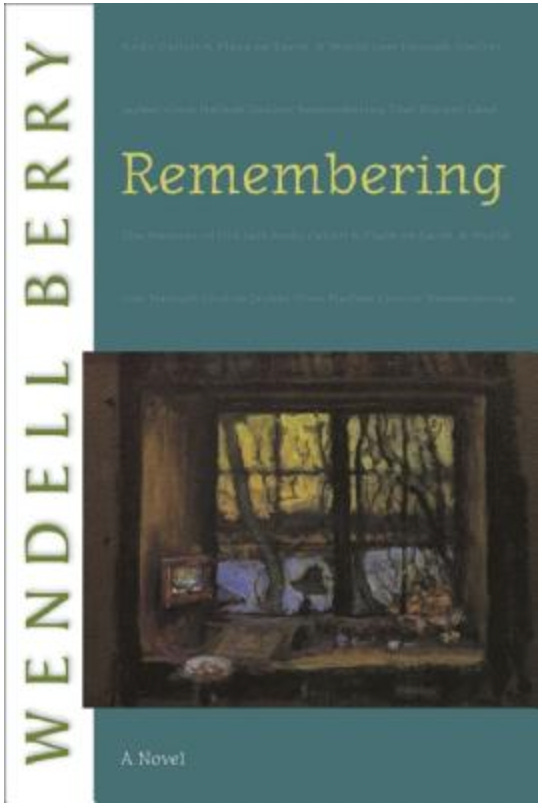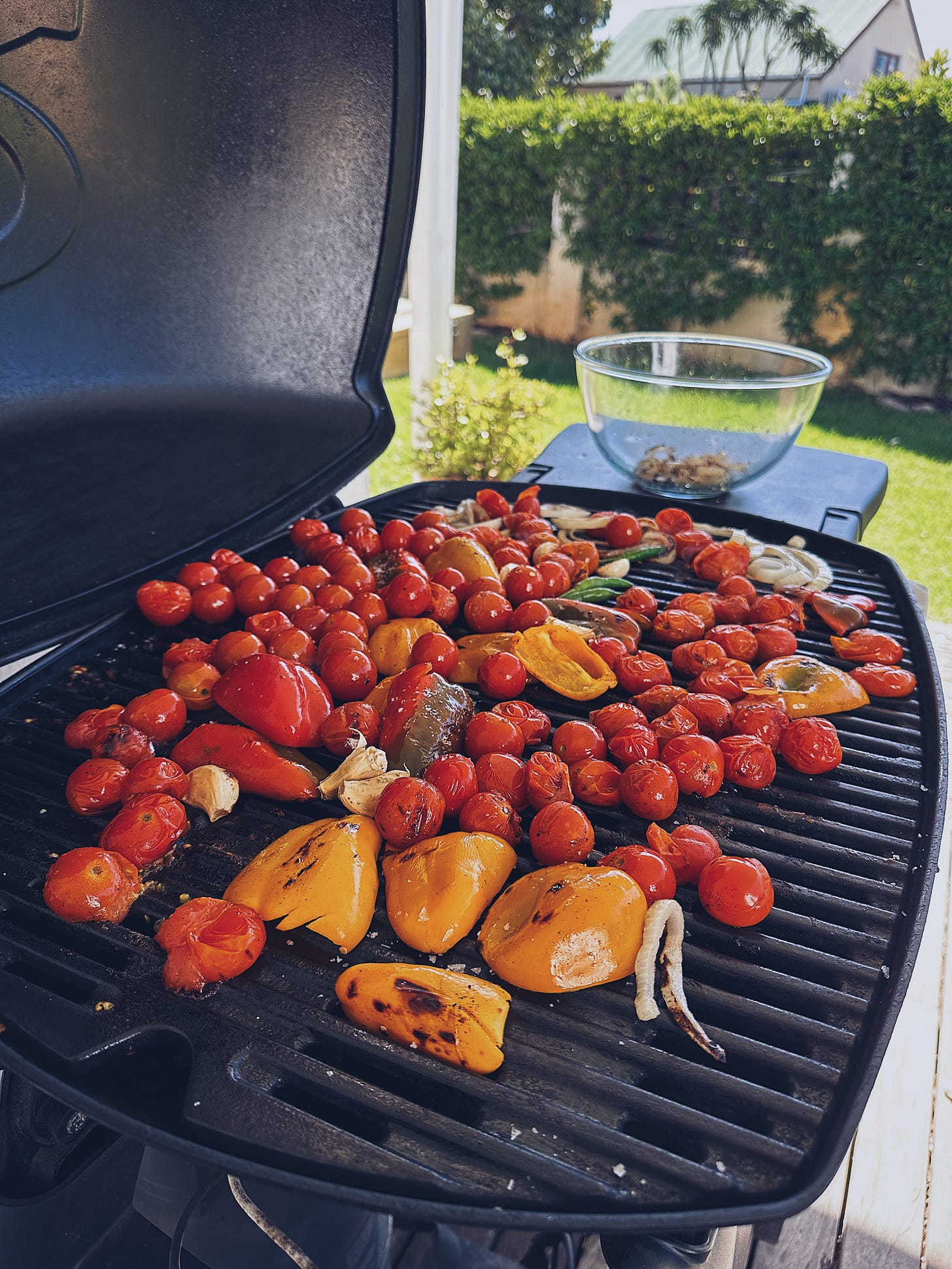The Lectio Letter - Issue #67 - Understand your unfolding gifting and calling
“If you only read the books
that everyone else is reading,
you can only think
what everyone else is thinking.”
- Haruki Murakami, novelist
“Do we enjoy our work, love our work, virtually worship our work so that our devotion to Jesus is off-center? Do we put our emphasis on service, usefulness, or being productive in working for God—at his expense? Do we strive to prove our own significance? To make a difference in the world? To carve our names in marble on the monuments of time? The call of God blocks the path of all such deeply human tendencies. We are not primarily called to do something or go somewhere; we are called to Someone
— Os Guinness
“The place God calls you to is the place where your deep gladness and the world’s deep hunger meet.”
— Parker Palmer
Welcome to Issue #67 of the Lectio Letter. This members-only newsletter is filled with music, film and food suggestions, links, and an article written by yours truly.
Whether you become a paid subscriber or not, I’m very grateful to each of you who read and respond to this newsletter.
The Lectio Letter is a reader-supported publication. To receive new posts and support my work, consider becoming a free or paid subscriber.
PSA: I’ve heard a number of people have been missing out on the whole email if they use Gmail because the email gets ‘clipped’.
You can see at the bottom of the email if it says “message clipped”, then click “View entire message” to see it all.
You are not getting it all if you don’t see my signature at the bottom.Alternatively, if you don’t want to read this in your email, you can use the substack app (where you can listen to the article read out) or read it online at LectioLetter.com
Introduction
Well, An overdue Lectio letter this time around. We were busy hosting a large gathering here in South Africa and then fell as sick as it gets right after. After a solid week of Flu-ish symptoms (not COVID, we tested;) We are now back in the land of the living.
Given all the fullness of these last weeks, I’m sharing an article with you that I initially wrote for a YWAM group called the European Leader Learning Community called “Understanding your Unfolding Gifts and Calling as a Leader”.
Most of us develop our gifts through a series of stumbles forward in the dark. There really isn’t a straightforward map for developing the kind of skills that are required to lead in the context you find yourself. Most of the Christian leadership books I’ve come across give some helpful pointers but are too vague and generalised to offer real help.
Leadership ultimately happens in context; a people, a place, a culture. Some places value certain attributes while those same attributes can disqualify from leadership in other places. Developing an ability to lead ultimately comes from being attentive to the people around you, building trust and reflecting on how God is leading and growing you to do that more effectively.
My article does exactly what I’ve said is most unhelpful above! I develop a generalised map. But what I’m trying to help people recognise is that the way you begin your leadership development does not work all the way through the development process. We begin by imitating other great leaders, but that approach must fall away at some stage once we have outgrown it. I hope the three phases I offer below help you find your own path in whatever place you find yourself with the privilege and responsibility of leading others.
Status Board
Reading
One of my reflections last year on all the books I read was the lack of good fiction which made it into my reading. But in These last couple of weeks, I’ve been reading almost nothing but fiction!
“All Persians are liars and lying is a sin.
That's what the kids in Mrs. Miller's class think, but I'm the only Persian they've ever met, so I don't know where they got that idea.
My mom says it's true, but only because everyone has sinned and needs God to save them. My dad says it isn't. Persians aren't liars. They're poets, which is worse.
“A god who listens is love. A god who speaks is law. At their worst, the people who want a god who listens are self-centered...And the ones who want a god who speaks are cruel. They just want laws and justice to crush everything...Love is empty without justice. Justice is cruel without love....God should be both. If a god isn't, that is no God.”
“Suddenly evil isn’t punching people or even hating them. Suddenly it’s all that stuff you’ve left undone. All the kindness you could have given. All the excuses you gave instead.”
“A patchwork story is the shame of a refugee.”
Everything sad is untrue is the (true) story of Daniel Nayeri’s life as an Iranian Immigrant to Oklahoma told as Nayeri’s seven-year-old self. It is quite extraordinary to read; it has the depth you would expect from a story that is rooted in fleeing Iran after a fatwa (Islamic death threat) is issued on his mother for attending an underground Christian house church. But it also follows his hilarious attempts to share his home culture with his new Oklahoman classmates (including hilarious poop stories!). Nayeri has written a book that draws you in, makes you laugh and other times cry. I can’t recommend it enough. After finishing it I immediately sent it to my niece.
“And then Andy told him about Meikelberger's farm. Had Isaac ever thought of buying more land – say, a neighbor's farm?
"Well, if I did I've have to go in debt to buy it, and to farm it. It would be more time and help than I've got. And I'd lose my neighbor."
"You'd rather have your neighbor?"
"We're supposed to love our neighbors as ourselves. We try. If you need them, it helps.”
“It was a country . . . that he and his people had known how to use and abuse, but not how to preserve.”
Remembering by Wendell Berry is the second in the Port William stories that I’ve read (see my review of his book Nathan Coulter in Lectio #64). This book is much more introspective, sombre and emotionally draining. The book followers Andy Catlett after the amputation of his hand in farming equipment. The grieving loss of becoming a person who is no longer able in the way he is used to. The book follows Catlett on a trip where he is due to give a hot-headed speech to Agri-business on the way it has destroyed the lifestyle of farmers. Catlett becomes the mouthpiece in many ways for the values of Berry himself. It’s eloquent and engaging as you might expect, although I’m currently reading another novel from this series Jayber Crow which gives much more context to the space and characters of Port William which may have helped in understanding Catlett’s position and life there.
I had enthusiastically picked up Rich Villodas’ book “The deeply formed life” a month or so ago and somehow it fell back onto the pile until I managed to finish it this week. Rich Villodas manages to make a case for a 21st Century Spiritual Formation in this book. He follows the new line of writers who are pastors in the more secular corners of the US; like John Mark Comer, Jon Tyson and Tyler Staton. What Villodas adds here is his heritage in the “Emotionally-healthy” work of Pete Scazzero and his stories from leading an exceptionally diverse church congregation in New York. For those that have read the other authors I mentioned much of this content will be well-travelled ground already, but Villodas is highly readable and accessible for those seeking to understand the tensions and opportunities of following Jesus in the 21st Century urban western world.
Music
Bongeziwe Mabandla, one of our favourite South African musicians released a new album this week. Here’s one of our favourite tracks on the album.
Soul band Monophonics song Sage Motel is on repeat…
Watching
We’ve been watching Transatlantic which is the true story of the American Emergency Rescue committee who worked to save intellectuals and artists (philosopher Hannah Arendt was on the only one I recognised) escaping Nazi occupation in France. While the story is fascinating, the way the series is shot has a beautiful Wes Anderson-esque aesthetic.
Eating
Roast Tomato and Pepper Salsa
Even though summer is basically over here, this Roast Tomato and Pepper Salsa is a secret weapon for Mexican Food. It takes some time but cooking this on a BBQ creates a great smokey flavour
Ingredients
800g of good quality, small, Rosa tomatoes (The skins are the most important part here, so don’t skim on quality)
4 whole garlic cloves
2 limes
2 yellow peppers
3 whole chillies (adjust for flavour, but roasting chillies mellows them considerably)
15g Coriander
Salt to taste
One onion
Process
Heat up the BBQ
Slice the Yellow Peppers into quarters removing the seeds
De-skin the garlic but leave whole
Slice the onion sideways into thick circles
Put Tomatoes whole, peppers, garlic cloves and chillies in a container and mix with a moderate amount of oil and salt.
Place on grill loose to medium-high heat until the tomatoes begin to burst (press them down to remove most of their water)
Watch all the ingredients and remove them when charred and soft
Blend the Corianders finely, then add onions, softened garlic, chillies and peppers and blend until almost smooth.
Finally add tomatoes which now should be quite charred and floppy, and blend with a few pulses until chunky.
Understanding your Unfolding Gifts and Calling as a Leader: Three Phases: Imitation, Clarification, and Personification
It was at the end of a busy conference in Taiwan when I hitched a ride to the airport with Floyd McClung to get some time with him. I had been watching him lead over the previous few years and had eagerly received all the wisdom and insights he had to give. As a ministry, we were headed towards a time of leadership transition, while at the same time, I was on a journey to more fully identify my own gifting and sense of calling.
"I realise I don't want to become you anymore," I said to Floyd, and he responded with his characteristic laugh which softened into a smile. I continued on, "I am so grateful for who God has made you to be, but I realise this is not my calling.” Despite the embarrassingly youthful presumption that I could become the next Floyd McClung, I had come to the end of the first phase of discerning my gifting: imitation.
Imitation: Phase l
Paul encourages the Corinthian church to follow his example as he follows Christ and so we see that imitation is not a bad thing. But imitation can be comparable to David trying on Saul's armour, you try it on only to discover it doesn’t fit. When we follow those who follow Jesus, we will come through their example to Jesus Himself, but Jesus is ultimately the only one through whom we can discern our true gifting. It is only when we hear the voice of Jesus remind us of our unsurpassable worth in His sight that we are free to discover what He has placed within us for the service of others.
Clarification - Phase II
From imitation, we move to clarification. This phase requires experimentation, reflection, and a deep groundedness of our worth in Christ.
Whereas the imitation phase has offered us the tried and true path of a fruitful leader, the clarification phase finds us exploring unbeaten paths that require a more expansive map. This phase is often filled with insecurity as we try to find our own voice, and it is common (almost expected) that we would make missteps in our exploration of how we are gifted. However, the redeeming reality at the core of this is that we will learn more through our mistakes than through our successes. Instead of relying on imitating the methods of another leader, we begin to deepen our own reliance on Christ and his work in our lives for the sake of others.
Three Simultaneous Callings
The Puritans developed an account of three simultaneous callings that can help every Christian at this point. The first (and highest) calling is to love and be loved by God. Without this, growth in our gifting and leadership is limited and ultimately unsustainable.
The second is a common calling. These are the things we are all called to in the scriptures, things we don't need to pray about: do not kill, steal or lie; love others as we love ourselves; make disciples, and so on.
The third calling is the specific calling which is the place and work that you are specifically called to: the calling to be a husband to your wife, or the calling to be a part of your specific community. Effectively, it is the calling to play the part that only you can play.
“Self-Expressive Individualism”
Our modern world has a historically “novel” way of conceiving what it means to be a human. Catholic philosopher, Charles Taylor, has called this, "self-expressive individualism.” Simply put, it is the belief, novel throughout human history, that your value in the world comes from your unique contribution.
If we unreflectively follow the modern belief of "self-expressive individualism" as we seek to discern our giftings, it is highly likely we will incessantly search for our particular gifts as a way to gain our sense of worth in the world, and we will end up building an identity rather than receiving one.
I have spoken to many wise, older leaders who report that in their own development, they relentlessly pursued their gifts and specific calling as a way to secure their sense of worth, only to become so busy that they neglected their highest and common calling, to love and be loved by God. Towards the end of their lives, I observed that they had become less enamoured with their own specific gifts, and more focused on pursuing their highest and common callings: to love God and those around them with deep integrity and authenticity.
Paying Attention to the Giver of the Gifts
I say all this to remind us that if we pursue clarification of our gifts from within the modern story of self-fulfilment, we will be incapable of becoming leaders who can lead in the way of Jesus. The clarification phase of discerning our gifting must pay deepest attention to the One who gives the gift and to the people around us to whom those gifts will be given away. In many ways, our gifts discover us when we stop fixating on finding them.
However, it is in the clarification phase that we can receive insights from all types of assessments: Myer's Briggs, Strengthsfinder, DISC, Enneagram and others. Self-reflection in the presence of the Holy Spirit, using these assessments, have given me some truly helpful self-understanding. But when we engage in these systems with a kind of “grasping for identity,” to define ourselves as unique for its own sake, a host of problems will arise.
If the modern script of “self-expressive individualism” misleads us to think that our worth is defined by our unique contributions, it also misleads us by seeing ourselves as individuals. The calling of Christians is to understand ourselves as “a people.” Our modern day individualism misleads us by ignoring the fact that we are inextricably bound up in a network of relationships.
In John 14:6, Jesus refers to himself as "the truth.” Those of us who have been shaped by Western education are prone to think of truth as an idea. But Jesus refers to himself as the truth, so truth is a person, not a set of impersonal ideas. Reality is inherently relational. Too often we think about our gifts as being the truth of who we are, as a set of impersonal attributes; organised, confident, gentle, detailed etc. But our gifts are not held in a vacuum. All of our gifts are identified and expressed through specific relationships in specific places. If we are to understand our gifts, we will need to receive feedback from those around us and to serve others through our gifts rather than simply serving and fulfilling ourselves.
Personification - Phase III
As we progress through clarifying our gifts, we will often find leadership assignments that stretch us well beyond what our gifts are or what we feel we are good at. And as we serve and seek to follow Jesus, we discover in Him one who didn't only give gifts, but gave Himself.
If the first phase of understanding our gifts comes through imitation, and the second through clarification, the third phase could be called personification. Simply put, we no longer worry about offering our gifts, and we begin offering our very selves.
In this phase, there is less anxiety about whether our gifts will be seen, acknowledged or respected, and we become motivated relationally by God for the sake of others. We gain a glimpse of this in Paul's words in 1 Thessalonians when he says, "Because we loved you so much, we were delighted to share with you not only the gospel of God, but our lives as well."
In the phase of personification, we become free to be who God has made us to be. We no longer strive for recognition or worry about fulfilling our potential. We simply become the type of people who can give our lives away to others in love and service through our gifts.
Ironically, it is at this phase where we are the least attached to our gifts for the sake of gaining worth that most people will see the gift of God in us most clearly. The gifts that God gives follow the pattern of the one who gives them, who reminds us in His words and life that "unless a kernel of wheat falls to the ground and dies, it remains only a single seed. But if it dies, it produces many seeds." Once the dream of self-fulfilment through our gifts is laid to rest, we are prepared to receive them back again for the sake and service of others.
Of course, this model I have offered in 3 phases, is an extraordinary oversimplification of the multifaceted dynamics of relating to your gifting over the course of a lifetime. But at the same time, models like this can offer us helpful navigational points that help us respond to the invitations and assignments we receive from God to be formed by Him into the likeness of His Son, who lived, died, and rose again on our behalf.
As you identify your own journey within these phases, the purpose is to participate with what God is doing in you now, not to ‘achieve’ the next phase. Take heart that what Paul wrote to the Philippians is just as true for you today: “I am confident of this, that the one who began a good work in you will bring it to completion by the day of Jesus Christ.”
Miscellaneous Links
It’s been a busy time, so I haven’t come across quite as much miscellany as normal. I still hope you enjoy these few links…
The Coronation of King Charles III
Some photos from the recent coronation of King Charles III
The most incredible moment of the extensive coronation ceremony was the anointing of King Charles, where he was anointed on his chest, head and hands with oil taken from Jerusalem. The musical backing of Handel’s Zadok the Priest was pretty amazing (skip to 1:20 for when it drops).
Why did early humans have perfect teeth?
Europe's new satellite snaps picture of Earth
Europe’s Meteosat Third Generation Imager-1 (MTG-I1) has delivered its first view of Earth revealing the weather conditions above Africa, Europe, and the Atlantic.
The image was captured on March 18, 2023, and shows a very cloudy day for people living in Northern and Western Europe. Only Italy and the Western Balkans had clear skies when the image was taken.
Woman survives on Wine and lollipops in Australian Bushland
A 48-year-old woman who was stranded for five days in the dense bushland of Australia said she survived on only wine and lollipops.
The woman, identified as Lillian Ip from Cheltenham by authorities, was treated at a hospital for dehydration after she was rescued by Victoria Police on Thursday, May 4, 2023.
“She was only planning a short-day trip so she had only taken a couple of snacks and lollies with her, but no water,” said Sgt. Martin Torpey of the Wodonga police station. “The only liquid Lillian, who doesn’t drink, had with her was a bottle of wine she had bought as a gift for her mother.”
A pretty amazing visualisation of just how wealthy the founder of Amazon is
In most countries, EVs are the future. In Norway, they are very much the present. Last year, nearly 4 of every 5 new cars sold in the country were fully electric — and the effects of that are now coming into view as the nation edges ever-nearer to its 2025 deadline for outlawing all gas-powered vehicles.
Via Chartr
That’s all for now…














